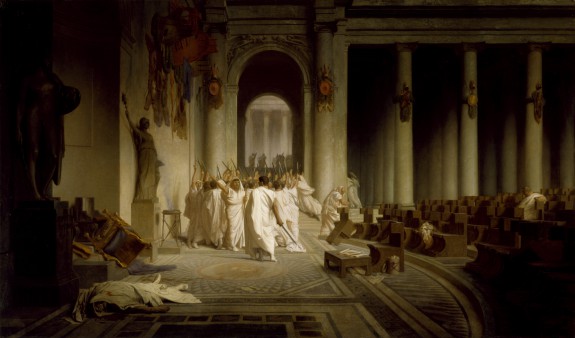Twenty three stab wounds was all it took to take down one of the most powerful leaders in Roman history. Despite being hailed as a powerful war hero in history, Julius Caesar was murdered in his own city by his own people on the Ides of March 44 B.C.E.1 Gaius Julius Caesar was born on July 13, 100 B.C.E. in Rome, and became dictator of the Roman Republic in October 49 B.C.E. The powerful image of Caesar even today cannot be compared, and that is why his legacy is still alive today. He was an ambitious figure that conquered modern day France, led the civil war, and influenced the fall of the Roman Republic. The Roman Republic before its fall served the wealthy and the privileged.2 Caesar did not want to do away with the Republic despite what critics say; all he wanted to do was reform it and give more power to the people. Members in the Senate, however, would not allow this. Julius Caesar’s assassination cannot be justified; it was treason and murder, even though those who murdered him defended their actions as tyrannicide.

The conspirators were not from outside forces of Rome; instead, they were from Caesar’s inner circle of elite senators. Caesar entrusted Brutus and Cassius to be his eyes and ears in the Senate, but they did just the opposite. Brutus, who was pardoned by Caesar after helping Caesar’s foe Pompey during the recent civil war, was one of the masterminds behind the assassination. In 44, Caesar appointed Brutus as proprietor of Gaul, or modern day France, which was one of the highest offices a nobleman could hold.3 Cassius, another conspirator who had been pardoned by Caesar at the beginning of his dictatorship, was also one of the masterminds behind the assassination. Repeatedly, Caesar seems to have contributed to his own death by pardoning those who did not deserve to be pardoned. Instead of dealing harshly with his enemies, he pardoned them and kept them close. He took the saying keep your enemies close to an extreme, since they ended up close enough to assassinate him.
In some ways, the conspirators who plotted against Caesar’s life had a clear justifiable reason in mind. The conspirators defied Caesar’s authority and perceived him to be a popular leader who threatened their privileged interests. They truly believed they were saving the Republic. They wanted to restore republican liberties that Caesar had robbed from them.4 For example, Caesar completely disregarded their unwritten constitution and the Roman mos maiorum, or ancestral customs, when he appointed commoners to offices that only aristocrats could hold. He was defying their unspoken and unwritten rule that commoners cannot be placed in charge.5 Doing away with Caesar would do good to the people of Rome; therefore, tyrannicide was justifiable in their eyes. And so their treasonous act will forever be remembered as the most infamous assassination in history.

Although some of his actions were faulty, Caesar did not deserve to die in the treacherous way that he did. Murder consists of three things and the conspirators held all three of them, which is intent, malice, and premeditation. The conspirators intended to kill Caesar before he left for Parthia on March 18, 44 B.C.E.6 The raid on Parthia would cause Caesar to be away for months on end, so the conspirators had to act quickly. They premeditated their attack before Caesar left by taking into account time, numbers, and politics. They knew Caesar would be unaccompanied and surrounded by Senate members such as themselves. They also knew that only Senate members were allowed inside the Senate chambers, prohibiting any outsiders Caesar usually surrounded himself with.7 Their malice was proven in the gruesome way Caesar was left on the steps of the Senate building. Together, they marched to the Senate, with daggers under their white togas, with intent, malice, and premeditation to kill Julius Caesar. Before Caesar’s assassination, every senator had to sign an oath in which they promised to maintain Caesar’s safety. The penalty for violating the oath was the death penalty.8 The Senators involved almost got away with murder, but Octavian, Caesar’s nephew and successor, and Marc Antony, Caesar’s best friend, hunted the assassins down one by one and avenged his murder.
- Encyclopedia Britannica, 2015, s.v. “Julius Caesar,” by Arnold Joseph Toynbee. ↵
- Michael Parenti, The Assassination Of Julius Caesar: A People’s History Of Ancient Rome (New York: The New Press, 2004), 47. ↵
- Encyclopedia Britannica, 2015, s.v. “Marcus Junius Brutus,” by E. Badian. ↵
- Parenti, The Assassination Of Julius Caesar: A People’s History Of Ancient Rome, 2. ↵
- Parenti, The Assassination Of Julius Caesar: A People’s History Of Ancient Rome, 3. ↵
- Barry Strauss, The Death of Caesar: The Story of History’s Most Famous Assassination (New York: Simon & Schuster, 2016), 54. ↵
- Greg Woolf, “Et Tu Brute? : Caesar’s Murder and Political Assassination” (London: Profile Books, 2006), 45. ↵
- Strauss, The Death of Caesar: The Story of History’s Most Famous Assassination, 51. ↵



49 comments
Sergio Cervantes
A great topic to write about the infamous assassination of Caesar! I liked how you included the three requisites needed to label an action as a murder. I never knew he wanted to restore power to the people and this shows he was a true lover of a government made legitimate by its people. It’s amazing to think that he was labeled as a tyrant by some people simply because they understood his threat to their power and privilege. Also, the beginning sentence was excellent as it quickly grasped my attention.
Ana Gonzalez
Nice article! You did a great job at the beginning conveying the power and strength that Julius Caesar had in ancient Rome. However, this power did not protect him from the people he trusted and he was literally stabbed in the back. You did a great explaining both sides on the debate whether his murder was treason or not. I think you were also very descriptive when explaining his murder. Great job!
Oscar Portillo
This was a good article and Julius Caesar has been debated for thousand of years and to say who was right is never going to be exact since thorough records do not exist. This is one of the most interesting cases of Tyrannicide since many people are on both sides. Some people believe that Julius Caesar was a good person and did what was necessary to consolidate the empire while others consider him a tyrant thirsty for power. Either way he was one of the most powerful men the world has ever seen.
Daniel Bailey
This was a very interesting article, it really open’s my eyes in understanding the life of Julius Ceasar and his moment of death by the people he trusted. This really reveals the one of his many flaws as a leader, that he let his guard down by being to forgiving to people who ones betrayed him. It was also compelling to learn that is was the senator who were already favored by Ceasar who decided to carry out the murder.
Samuel Sanchez
This was an interesting article. I never really knew he was stabbed twenty three times. I thought it was less than ten but this was a bit of an over kill. I never knew that his inner circle of elite senators were pardoned by him. I guess he thought he could keep an eye on them but that ended up his biggest regret.
Aaron Mcglown
This is an interesting topic to write on. I enjoyed how you explained the whole assassination. It was well organized, well written, and pack with strong and reliable sources. I never knew Julius Caesar was assassinated. Being stabbed and murdered twenty-three times by your own people is horrible. This makes me question the ones that I’m close to. Overall, very good article.
Aaron Jaramillo
This is an interesting topic! You did a good job of writing and organizing your article. I’ve heard of Julius Caesar but never he was assassinated. To be stabbed twenty-three times and murdered is horrible but to be stab twenty-three times and murdered by your own people is unthinkable. It makes you question the people around you. Overall, well done on this article.
Aimee Trevino
Very well-written explanation! I enjoyed your use of “Keep your enemies close.”, as I feel it perfectly describes what went on to happen. I find it interesting that he kept forgiving the people who wronged, which is honestly a brave thing to do, as I am positive I would not be able to do the same. However, that did end up hurting him.
Yesenia Cardenas
I enjoyed your article especially how you mentioned the expression “keep your enemies closer”. I was thinking of that expression as I was reading your article. For your “friends” to stab you so many times when they are supposed to protect you is so ironic.
Maalik Stansbury
I enjoyed how you explained the assassination. I thought the whole article was well-written and expressed the best parts of what really happened. I only usually think Shakespeare when hearing Julius but this changed my perspective or at the information i know about what happened. I think you did an excellent job writing the article and described everything very well.